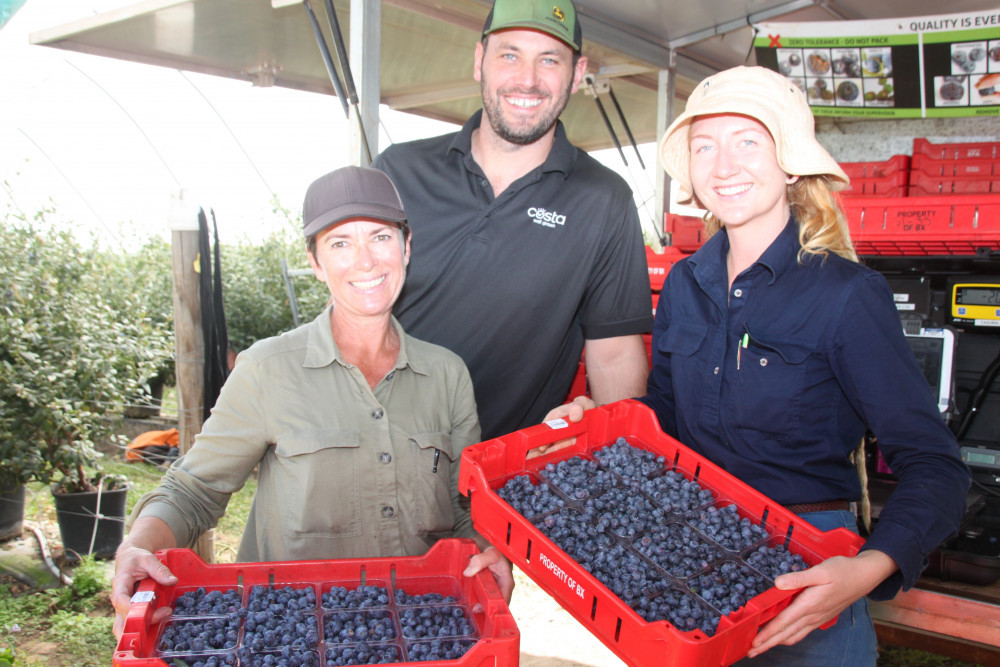Community & Business
11 June, 2021
High risk, high reward for Tableland blueberries
THE Costa Group's move into growing blueberries on the Atherton Tablelands promised both high risk and high reward for one of the country's largest growers, producers and marketers of fresh fruit and vegetables.

BY SALLY TURLEY
THE Costa Group's move into growing blueberries on the Atherton Tablelands promised both high risk and high reward for one of the country's largest growers, producers and marketers of fresh fruit and vegetables.
With an operation spread across every state in Australia, including 4700ha of planted farmland, 30ha under glasshouse facilities and three mushroom growing operations, Costa had identified an autumn gap in their fresh blueberry supply.
“We had January to March covered with New Zealand fruit and the Northern New South Wales’ produce kicks in by June, but we were looking for somewhere to grow that April to June crop. We already had bananas growing around Atherton and the company decided to run a 1ha trial on our Rangeview farm,” said Regional Manager for Costa Berries FNQ, Ben Turner.
“We knew there would be a premium for fresh berries grown at that time of the year, but we were aware of the pest and disease pressures we would be facing, by attempting to grow blueberries in the northern tropics.
“The Monolepta Fruit Spotting Bug adults and the nymphs feeding (on the berries) by piercing fruit and sucking the juice from the tissue causing significant crop damage, and fungal diseases such as Botrytis cinerea, which blights blossom and stops fruit production, are just two of a suite of berry pests whose impact is exacerbated by the humidity,” Mr Turner said.
“But being able to supply blueberries at this time of year does generate a price advantage. For these few months, we have the fresh berry market to ourselves, compared to the July to September period when we are virtually at the mercy of New South Wales fruit production.
“Our premium ‘Arana’ variety, which is a larger, excellent tasting fruit generates a 15% premium and while production is more expensive here in the north, blueberries deliver a $/Megalitre water efficiency that is unbeatable in any other commercial crop.”
As one of the area's biggest employers, Costa Group maintains around 20 staff through the quieter summer period, ramping up to 400 employees during peak season in June-July.
We prune in September, grow the canopy through summer and the flowers set just after Christmas.
Usually, it is 60 days from flowering to effective blueberries and the plants will continue flowering right through the season.
A slightly delayed wet this season led to a slightly later than usual harvest. We can normally tell what the crop will do 2 months out and we are getting a reasonable yield this year.
Mr Turner said their seasonal production target is 1000 tons or 8 million punnets, from February to August, peaking in June.
All the farms, including the 42ha block on Beantree Road, the 17ha on Chewko Road, Walkamin and the 19ha at Rangeview are farmed as one with around 60% seasonal hire and 40% direct hire – both locals and backpackers.
Because finding enough good staff each year becomes challenging, Costa Group have implemented several staff incentive initiatives.
Staff can transfer between farms, following the scenic harvest trail around Australia and Labour Resourcing Co-ordinator for FNQ Berries, Kristen Ollson, does a lot locally to see staff are looked after, including the pre-inspection and approval of accommodation options to ensure they meet Costa's required standard.
Costas also pick up the tab for travel and quarantine costs to get staff on-site and Kristen works to create a family atmosphere on the job by putting on staff lunches at a different jobsite each Wednesday and rewarding good performance with vouchers that support spending with local businesses.
Ben Turner said a varietal advancement program aimed at continually improving their yield timing and flavour profile into the future through the identification of optimal genetics is a constant component of the northern operation.
“We are currently losing 30% of our yield because we have to prune our bushes before they stop producing to get the timing right for the next season, but that loss is off-set by the work our Horticultural Manager, Melissa Mullee and her team have been doing,” he said.
“We are now able to have newly established substrate blueberry plants achieving full yield in their first year. Choosing to grow substrate blueberries (in pots rather than in the soil), reduces soil-borne pests and diseases and gives better control over aeration, moisture and plant nutrition.
“Pioneer farming is a little harder to predict, but we are getting dangerously close to achieving knowledge" he said.
"We retail 95% of our berries across Australia through the major cities' distribution centres. Coles and Woolworths are our biggest retailers.
“Costas donate fruit from their farms to local schools and aged care facilities and supports many local community organisations.
“We are currently in a consolidation phase, but the future looks bright.”



